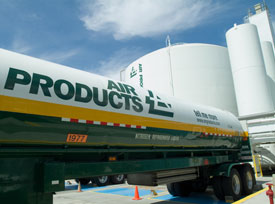Petronas picks Air Products equipment, technology for Malaysia FLNG unit
Air Products' liquefied natural gas (LNG) technology and equipment will be floating on an LNG production platform off the coast of Malaysia and producing 1.2 million tpy of LNG when the Petronas PFLNG 1 project starts up in late 2015.
The company on Wednesday signed an equipment and process license agreement with Malaysia-based energy major Petronas. Terms were not disclosed.
"This project will showcase not only our proprietary and leading LNG technology and equipment, but also Air Products' worldwide manufacturing capabilities, as portions of the equipment will be fabricated and assembled in the United States and Asia," said Bill Kennington, major account manager for LNG with Air Products.
 "This floating LNG (FLNG) project is very important for Malaysia by unlocking and enabling economic development and commercialization of significant gas reserves from locations where the resource was essentially stranded,” he added.
"This floating LNG (FLNG) project is very important for Malaysia by unlocking and enabling economic development and commercialization of significant gas reserves from locations where the resource was essentially stranded,” he added.
PFLNG 1, to be located off the coast of Bintulu, Sarawak, Malaysia, will use Air Products' AP-N LNG process and equipment.
The proprietary equipment includes coil wound heat exchangers to be built in Wilkes-Barre, Pennsylvania; compressor-expanders to be assembled in Fogelsville, Pennsylvania; and economizer cold boxes to be built in Tanjung Langsat, Malaysia.
The equipment will be shipped from the three Air Products manufacturing facilities for assembly into modules and then installed on the PFLNG 1 vessel, the company said.
Air Products claims the AP-N LNG process is the most efficient of all nitrogen-recycle LNG processes in the industry, and is ideally suited for small-scale FLNG applications.
This is the initial use of the AP-N LNG process and equipment. Its development builds on the successful implementation of the nitrogen-recycle section of Air Products' AP-X system, which has been operating reliably for over three years in Qatar, the company says.
The AP-N system can be configured in an all-nitrogen recycle process for a single train at a nominal 1 million tpy, or it can be boosted in capacity with the addition of pre-cooling.






Comments